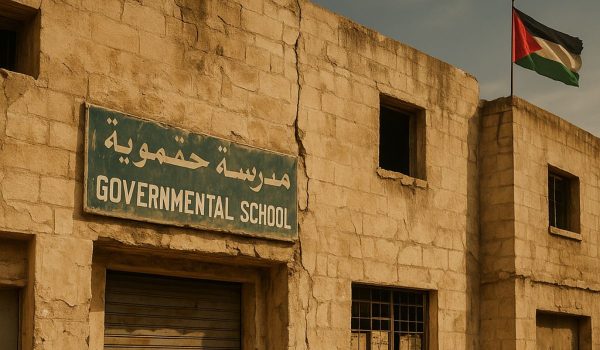Across Palestine, institutions serve as the backbone of society. Schools, hospitals, civil society organizations, and local governments work daily to meet the needs of their communities. But many of these institutions operate under extreme pressure—financial, political, and logistical. One major factor behind these challenges is the impact of international sanctions.
Sanctions are often introduced with political goals in mind. They are intended to pressure leadership or discourage certain activities. But in practice, these restrictions reach far beyond high-level politics. They shape the ability of everyday institutions to function, to serve, and to survive.
Why This Matters to Palestinian Development
This article looks at how sanctions affect Palestinian institutions on the ground. From delayed salaries and halted infrastructure projects to barriers in education and healthcare, the effects are wide-reaching.
We’ll focus on how sanctions interrupt daily operations, limit funding, restrict global partnerships, and strain the capacity of public services that Palestinians rely on.
A Freeze on Financial Lifelines
One of the most immediate impacts of sanctions is financial paralysis. Institutions often rely on funding from donors, NGOs, and international agencies. But when sanctions target government bodies or affiliated institutions, banks freeze transactions, block transfers, or close accounts altogether.
This means schools may go without supplies. Hospitals can’t pay their staff or order essential medicine. Youth centers might cancel programs because their grants never arrive. The damage is not abstract. It’s seen in missing services and empty shelves.
Even when organizations are not directly sanctioned, they can become what’s known as “de-risked.” Banks and funders avoid them out of fear they’ll be caught in legal complications. This leads to over-compliance and additional barriers for institutions trying to stay afloat.
Delays, Disruption, and Dependence
Sanctions don’t just block money—they slow everything down. Routine tasks like renewing contracts, importing goods, or partnering with international bodies become harder. Paperwork grows. Delays multiply. Simple tasks become expensive, complicated, and uncertain.
Institutions that once managed their own affairs find themselves more dependent on outside agencies to navigate legal, diplomatic, or financial systems. This weakens local autonomy and slows down progress.
In some cases, entire projects collapse under the weight of restrictions. Water systems remain unfinished. Clinics operate at partial capacity. Vocational training centers cut their programs in half.
The frustration grows not just from what’s lost, but from what could have been achieved if the barriers weren’t there.
Education Under Pressure
Universities and schools face some of the most lasting effects. International partnerships help Palestinian institutions gain access to research funding, academic exchanges, and global conferences. Sanctions make this harder.
Some educational grants get blocked. Research partnerships stall because of banking issues or licensing complications. Visiting scholars hesitate to collaborate, fearing legal risks or delays in payment.
Students lose opportunities to learn and connect. Faculty members are forced to do more with less. And administrative staff spend valuable time navigating restrictions instead of supporting learning.
All of this contributes to a sense of isolation—and unfairness. Palestinian students often work twice as hard to access half the resources.
Civil Society on the Frontlines
Many of the most active institutions in Palestine are small civil society organizations. They support women, children, disabled persons, farmers, and displaced communities. They fill gaps left by the state and provide vital services.
But sanctions can hit them especially hard. Their budgets are small. Their funding comes from a mix of donors, many of whom worry about compliance. A single delay or frozen account can derail months of planning.
These organizations often operate without the legal or political protection that larger institutions enjoy. They are seen as vulnerable, even when their work is deeply rooted in care and solidarity.
Despite the risks, many keep going. They find creative ways to serve their communities—through volunteerism, small local donations, and tireless organizing. But the cost of operating under sanctions is paid in stress, burnout, and missed potential.
Healthcare in a State of Uncertainty
Healthcare institutions are another area where sanctions leave lasting scars. Hospitals and clinics need stable systems to manage supplies, training, and patient care. Sanctions bring unpredictability.
Medical supplies can be delayed or blocked entirely. Partnerships with international hospitals or academic institutions get suspended. Training programs are canceled or postponed. Patients with chronic conditions may find their treatment interrupted.
Doctors, nurses, and administrators do everything they can to keep services going. But they often feel trapped—asked to do the impossible with limited resources and inconsistent support.
When healthcare suffers, entire communities feel the strain. Trust erodes. Outcomes worsen. And the idea of dignity in care becomes harder to uphold.
Shaping the Future Under Restrictions
Young people growing up under sanctions see their institutions struggle. They notice when a local library closes or when a youth center cuts back on programs. These changes shape how they see the future—and what they believe is possible.
The damage isn’t just economic or administrative. It’s emotional. It limits vision. It discourages ambition. And yet, many young Palestinians still step forward. They join student councils. They start grassroots initiatives. They refuse to give up on their institutions.
Their resilience deserves more than admiration. It deserves real support. Support that’s practical, consistent, and free from political conditions that hurt the very communities these institutions are trying to serve.
Sanctions on Palestinian institutions do more than restrict—they reshape entire systems. They make daily life harder for educators, healthcare workers, and civil society leaders. But even under pressure, these institutions persist. They continue to serve, to imagine, and to lead. And that persistence is a form of strength that cannot be frozen or blocked.

